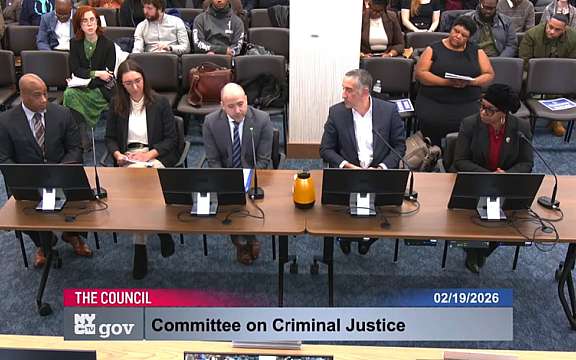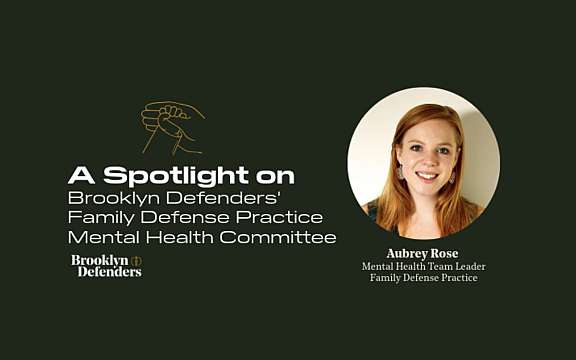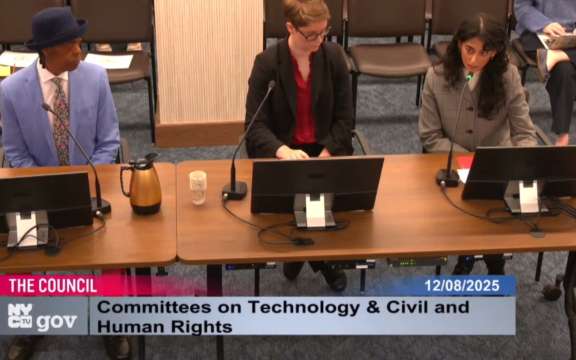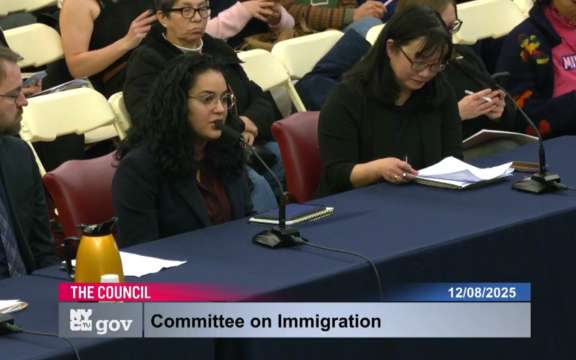BDS Testimony before New York City Council Committee on Criminal Justice on Housing and Reentry
TESTIMONY OF:
Alexandra Dougherty, Senior Staff Attorney and Policy Counsel
Civil Justice Practice
BROOKLYN DEFENDER SERVICES
Presented before
The New York City Council
Committee on Criminal Justice
Jointly with the Committees on Justice System, General Welfare, Public Housing and Housing and Buildings
Oversight Hearing on Housing and Reentry
October 21, 2020
I. Introduction
My name is Alexandra Dougherty, and I am a Senior Staff Attorney and Policy Counsel of the Civil Justice Practice at Brooklyn Defender Services (BDS). I want to thank the Committee on Criminal Justice, Committee on Justice System, Committee on General Welfare, Committee on Public Housing and Committee on Housing and Buildings for the opportunity to testify today. I would like to take this opportunity to speak in support of removing barriers to public housing for New York City residents with arrest or conviction histories.
Brooklyn Defender Services provides multi-disciplinary and client-centered criminal, family, and immigration defense, as well as civil legal services, social work support and advocacy, for nearly 30,000 people in Brooklyn every year. BDS’ Civil Justice Practice (CJP) aims to reduce the civil collateral consequences for people who have had interaction with the criminal, family or immigration legal systems. We also serve our clients with additional civil legal needs; we know that even a minor housing or benefits issue, if unaddressed, can have insurmountable repercussions, especially for people who are already dealing with serious problems in other forums. In this work, we routinely assist clients in a wide range of NYCHA issues including defending residents facing the termination of their tenancies due to allegations of criminal conduct by a household member, advocating for family court-involved clients to be approved for NYCHA housing to facilitate reunification, and lobbying for the safety transfers or repairs necessary to ensure our client’s homes are safe for them and their children to live in.
II. Background
NYCHA has a practice of denying applicants and evicting households based any contact with the criminal legal system. We know that stable housing is a vital prerequisite to successful recently. By relying on the mere existence of an arrest or conviction record, NYCHA exacerbates the disparate impact of the criminal legal system on Black and Latinx New Yorkers, who make up about 90% of NYCHA tenants. There is no evidence that these policies have made NYCHA residents safer. Instead, NYCHA’s punitive policies disrupt families and contribute to the City’s homelessness crisis by barring New Yorkers with conviction records from stable affordable housing.
As the Council knows, New York City’s existing homelessness crisis will soon be compounded by the looming wave of evictions brought by the Covid-19 pandemic. Like the pandemic itself, this eviction crisis is expected to disproportionately affect Black tenants and other communities of color. In this context, it is particularly urgent for NYCHA to overhaul its existing web of exclusionary policies that exacerbates the city’s homelessness crisis and bars system-involved New Yorkers from stable affordable housing.
We commend the Council for its effort to acknowledge and address barriers to affordable housing with Intro 2047-2020, which would ban discriminatory criminal background checks in private housing. We urge the Council to pass Intro 2047. But that bill, if passed, will not apply to public housing, where arrest and conviction history is explicitly incorporated into the eligibility criteria and termination procedures.
III. Existing NYCHA policies
Eligibility
NYCHA tenancy requirements are governed by federal law, but NYCHA’s own regulations go significantly further than legally required in barring potential tenants with conviction records and in evicting current tenants who have any contact with the criminal legal system. Federal law only requires housing authorities to deny applicants who have been evicted from public housing for drug-related criminal activity, convicted of methamphetamine production, or are subject to a lifetime sex offender registration.[1] Housing authorities are also granted broad discretion to screen for illegal drug use and alcohol abuse. Despite that discretion, NYCHA’s policy is to automatically deny any applicant with a conviction from the past three to six years, depending on the level of conviction. NYCHA also mandates denial based on any illegal drug use within the past three years. These strict eligibility criteria, which are not required by HUD, have the harshest impact on families and communities with minor law enforcement contact who are excluded from public housing.
Clients of the Civil Justice Practice routinely face multiple barriers to stable and affordable housing, and for many, housing options are even further limited by an old arrest or conviction history. These clients are also ineligible for federally subsidized and public housing—supposedly the housing of last resort. Each year we represent dozens of people appealing a finding of ineligibility based on an arrest or conviction record. One such client, Ms. S, was living in shelter after she left her abuser. Securing stable housing was the last barrier to reunification with her son, and she expected that her N-0 priority code would result in an imminent approval for a NYCHA apartment. However, NYCHA automatically found her ineligible based her single arrest, which stemmed from an incident in which she was a domestic violence victim, and which triggered her homelessness in the first place. Ms. S’s criminal case eventually resolved with a non-criminal disposition, and she had a strong argument and robust evidence to present in a hearing appealing her denial. But instead of proceeding with the lengthy informal hearing process to appeal the denial, she decided to prioritize reuniting with her son and moved into an apartment where she would be severely rent-burdened. She opted for housing that was ultimately less stable and affordable, even though should likely would have succeeded in reversing her NYCHA denial, because NYCHA’s strict eligibility criteria delayed her family’s reunification.
Termination of Tenancy Procedures
NYCHA routinely seeks to terminate the tenancy of entire households based on a single arrest or conviction of one family member. The pretext for pursuing termination is to maintain safety in public housing by evicting “dangerous” tenants. But rather than examining the circumstances of the arrest or determining whether the allegations indicate that the tenant poses a threat to safety, NYCHA pursues termination in most cases.
Ms. A and Mr. V are recent CJP clients who live in NYCHA with their ten-year-old daughter with special needs. NYCHA started a termination proceeding against Ms. A, who was the head of household, based on Mr. V’s arrest. At the first hearing date NYCHA offered a settlement agreement in which Mr. V would be permanently excluded from the apartment on the basis of his arrest. His permanent exclusion would have been devastating for the family because Mr. V is their daughter’s primary caregiver during the day while Ms. A is getting treatment for a chronic health issue. Instead of advising Mr. V and Ms. A to settle, we showed NYCHA proof that the criminal case had been dismissed and sealed; permanent exclusion based on that arrest would be a violation of New York State sealing statutes. NYCHA declined to pursue the termination proceeding and our clients were able to avoid any threat of eviction and disruption to their family’s stability. This case is an exception to the norm: NYCHA routinely rushes termination of tenancy proceedings before a criminal case can be resolved in the tenant’s favor, and pushes tenants to accept permanent exclusion settlements regardless of the disposition of the criminal case.
IV. Proposed NYCHA Policy and Recommendations
Brooklyn Defender Services is submitting joint comments regarding NYCHA’s proposed policy change directly to NYCHA, but we would like to highlight several points today:
- We support the goal—to provide applicants with a conviction history a pathway to access stable housing—of NYCHA’s proposed committee review process. Yet this goal is inconsistent with NYCHA’s existing eligibility criteria. An additional procedural hurdle in the form of a panel review is not a substitute for necessary reform to NYCHA’s eligibility criteria and strict eligibility bars based on conviction history. NYCHA’s goal is also hindered by their existing practice of seeking termination based on a single arrest, and litigating those termination cases for several years after the alleged incident. Together, NYCHA’s eligibility rules and termination of tenancy procedures extend the punitive effects of the criminal justice system and must both be changed.
- Similarly, BDS supports NYCHA’s attempt to change its permanent exclusion policy, but the proposed change is insufficient. The proposal fails to address the underlying problem with NYCHA’s practice of settling termination of tenancy cases. When NYCHA does consent to settle, their attorneys are only authorized to use pre-written universal stipulations. By limiting settlement options, these stipulations pressure tenants into certain outcomes that put them at heightened risk of eviction. While we agree that permanent exclusion should never be indefinite, tenants facing termination should be able to enter into individualized settlements that are tailored to the underlying allegations.
V. Conclusion
BDS supports NYCHA’s efforts to remove barriers to public housing for New Yorkers with conviction records but their proposed changes to policy must go further to ensure that those with criminal system involvement have access to and can maintain stable housing for themselves and their families. Thank you for considering my comments. If you have any questions, please feel free to reach out to me at 718-254-0700 ext. 141 or adougherty@bds.org.



